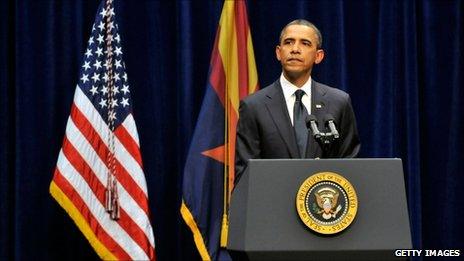Obama's call to 'moral arms' at Arizona memorial
- Published

Mr Obama called for a change in the way people speak of what matters to them
In the days and hours before US President Barack Obama spoke to the people of Tucson, Arizona, the commentary came thick and fast about the speech that lay ahead and the speeches that had preceded it.
Those mentioned included Ronald Reagan's legendary address to the nation after the explosion of the Space Shuttle Challenger, and Bill Clinton's speech after the bombing of the Alfred P Murrah Federal building in Oklahoma City.
Inside the McKale Memorial Center in Tucson, days after the shooting that that left six people dead and Congresswoman Gabrielle Giffords in a critical condition in hospital, none of that mattered.
The nation might be watching, but for the 14,000 crowded inside and the 10,000 others sitting in the nearby Arizona Stadium, Mr Obama had come to talk to them.
Within the arena, the atmosphere was taut and charged.
As those connected with the shootings appeared - doctors, relatives, the sheriff and state politicians - the crowd lifted off their seats and clapped and cheered.
And when the president and his wife entered, the crowd howled with what sounded like longing, and some pain.
"This is a small college town," University of Arizona President Robert Shelton said. "It is, in the truest and best sense of the word, a community."
The crowd rose again. Stony-faced, President Obama stood at the lectern.
The "Congress on Your Corner" held by Gabrielle Giffords outside a local supermarket on Saturday morning was, he said, "a quintessentially American scene, shattered by a gunman's bullet".
He spoke of the victims at length; a federal judge, three senior citizens, a young aide to Ms Giffords, and a nine-year-old girl.
Repeatedly the president invoked the Old Testament.
"When I looked for light, then came darkness," he said, quoting Job.
Humility
There was stoicism too; Daniel Hernandez, credited with saving the life of Ms Giffords after she was shot, had to breathe deeply to control his emotion after the president called him a hero and the crowd roared its thanks.
Daniel Hernandez was hugged by Rep Giffords' husband during the memorial ceremony
Mr Obama did not avoid the debate that has roiled the US over the last few days; whether the polarised politics and sometimes rabid rhetoric of contemporary America had in some way contributed towards the tragedy.
On that issue directly he took no side; he invoked the president's privilege to rise above that debate.
"We cannot use this tragedy as one more occasion to turn on another," he said.
Instead he called, not for the first time, for change - a change in the way that people speak of what matters to them.
He called for humility.
"Rather than pointing fingers or assigning blame, let us use this occasion to expand our moral imaginations, to listen to each other more carefully, to sharpen our instincts for empathy and to remind ourselves of all the ways our hopes and dreams are bond together."
It was in some ways a call to moral arms; it was a speech shot through with compassion and introspection.
Within the McKale Memorial Center, the atmosphere was taut and charged
At such times, the president said: "We recognise our own mortality and are reminded that in the fleeting time we have on this earth that what matters is not wealth or status or power, or fame - but rather, how well we have loved, and what small part we have played in better the lives of others."
Time and time again the crowd left their seats to cheer and clap their president.
And as he turned, towards the end of his speech, to the death of nine-year-old Christina Taylor Green his own mood changed. Mr Obama is the father of two girls; his emotion was, if not raw, then plain to see.
Tears trickled down the faces of some in the audience; others looked away from the podium, unable to deal with the intensity of their emotions.
"In Christina we see all of our children," he said. "So curious, so trusting, so energetic, so full of magic. So deserving of our love. And so deserving of our good example."
The final standing ovation was the longest and loudest. The crowd had what they had come for.
"There is nothing I can say" said Mr Obama at the start of his speech, "that will fill the sudden hole in your hearts."
He was right. But he came close.
- Published12 January 2011
- Published12 January 2011